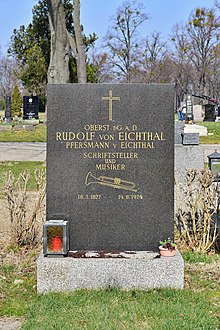Rudolf von Eichthal
Rudolf von Eichthal , actually Rudolf Pfersmann von Eichthal (born March 18, 1877 in Mährisch Trübau , † August 14, 1974 in Vienna ) was an Austrian officer, professional musician and writer.
Life
Eichthal came from the Bohemian aristocratic family Pfersmann von Eichthal and completed an officer training in the Austro-Hungarian army. In 1898 he was retired from the Theresian Military Academy in Wiener Neustadt . In the First World War he served - most recently as Colonel d. G. - 1914/1915 in the Tyrolean national defense (commander Viktor Graf Dankl ), 1916–1918 as chief of staff of the Corps section South Tyrol, 1918 in Russia and the Balkans. In the summer of 1915 Eichthal warned the Chief of Staff Franz Conrad von Hötzendorf urgently that the Tyrolean national defense was not in a position to adequately man the fortifications and to secure the border against a possible Italian attack.
After the end of the war he entered the service of the federal theater and was a member of the stage orchestra. As a trumpeter he founded the trumpet choir of the Bundestheater and directed it until 1937, when he retired. As an old Austrian , Eichthal rejected National Socialism and wrote on March 13, 1938 - the day of the Anschluss - in his diary: “This is the end of millennial Austria !!! [...] His death lamp will be the Second World War, which will drown all of Europe in a sea of blood and tears. "
From the beginning of the 1930s he came out with cheerful novels and stories in which he vividly describes everyday life and the culture in the Austro-Hungarian army. His work reveals a nostalgic, transfigured view of the monarchy and the army. His main work is the trilogy about the half-orphan Erwin Spielvogel on his way from cadet to field marshal , in the novels The divine spark (1937), The golden clasp (1941), The green plume (1951) and The marshal's baton (1955). Eichthal's novels achieved high print runs, although they were aimed almost exclusively at the relatively small Austrian book market.
Rudolf von Eichthal was buried in a grave of honor at the Vienna Central Cemetery. His estate is in the Austrian National Library .
From 1919 until his death, Eichthal lived in the house at Landstraßer Hauptstrasse 4 in the third district of Vienna. He was married to Theresia, born von Kreutzbruck zu Lilienfels. On the occasion of his hundredth birthday, the Vienna Military Command put a plaque on this house.
In Eisenstadt , Rudolf-von-Eichthal-Strasse is named after him.
literature
- Miczike , novellas from the old Austrian army, publishing house “Das Berglandbuch”, Salzburg, Printed in Austria, 1931.
- Porter Maria , A novel from Austria in Babenberg, Scholle Verlag, Vienna 1946
- The Great Silent Woman , Stories from Old Austria, Scholle Verlag, Vienna 1949.
- The Hussar Rehearsal , Stories from Old Austria, Georg Prachner Verlag, Vienna 1950.
- The divine spark , novel from Old Austria, Verlag Kremayr & Scheriau, Vienna 1978, ISBN 3-218-00320-2
- The green feather bush , novel from Old Austria, Kremayr & Scheriau publishing house, Vienna 1979, ISBN 3-218-00330 X
- The golden clasp , novel from Old Austria, Kremayr & Scheriau publishing house, Vienna 1979, ISBN 3-218-00323-7
- The Marschallstab , novel from Old Austria, Kremayr & Scheriau publishing house, Vienna 1980, ISBN 3-218-00337-7
- Military Command Vienna (Ed.): Rudolf v. Eichthal - officer, writer, musician. A life for Austria . Vienna 1969.
Individual evidence
- ↑ Alexander Jordan: War for the Alps: The First World War in the Alpine Space and the Bavarian Border Guard in Tyrol . Duncker & Humblot, Berlin 2008, ISBN 978-3-428-12843-3 , p. 216.
- ^ Austria remembers the "Anschluss" in 1938. In: Neue Zürcher Zeitung . April 3, 2013.
- ↑ Wendelin Schmidt-Dengler: Without nostalgia. On Austrian literature from the interwar period. Böhlau Verlag, Vienna / Cologne / Weimar 2002, ISBN 3-205-77016-1 , p. 75f.
Web links
- Rudolf von Eichthal in the Vienna History Wiki of the City of Vienna
| personal data | |
|---|---|
| SURNAME | Eichthal, Rudolf von |
| BRIEF DESCRIPTION | Austrian officer, writer and musician |
| DATE OF BIRTH | March 18, 1877 |
| PLACE OF BIRTH | Moravian Trübau |
| DATE OF DEATH | August 14, 1974 |
| Place of death | Vienna |

